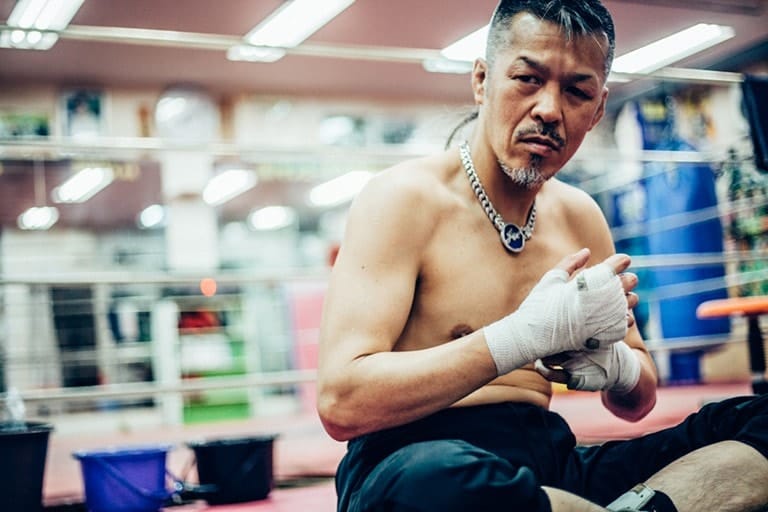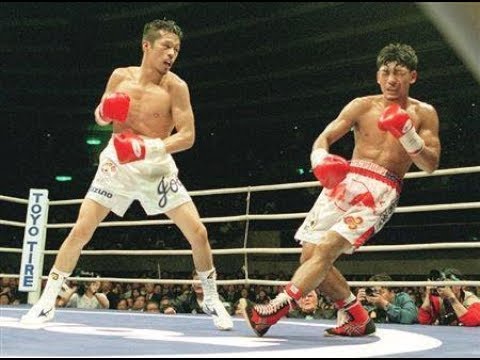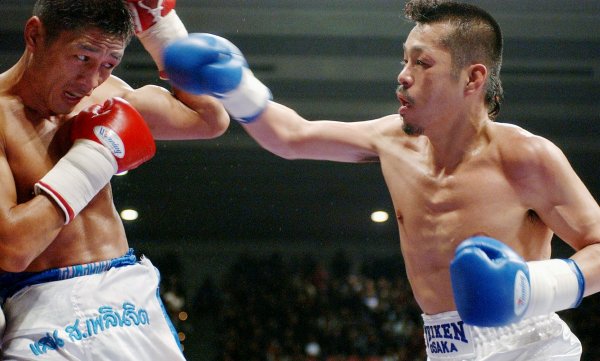Books We're Reading
When Violence is Necessary
"When Violence Is the Answer: Learning How to Do What It Takes When Your Life Is at Stake" by Tim Larkin, a self-protection expert and former military intelligence officer, provides [...]
Share this
Three time World Boxing Council (WBC) World Bantamweight champion Jôichirô Tatsuyôshi, is the subject of Joe, Tomorrow: 20 years with Joichiro Tatsuyoshi (2015), directed by Junji Sakamoto and produced by King Records. Sakamoto is no stranger to the ring, having delved into the boxing world with three of his features, including his celebrated 1989 debut feature Knockout, made the same year Tatsuyôshi went pro.

Source: mocmmxw.com
The parallel between director and subject is but one layer of this documentary’s fascination.
Another is its spanning of two decades in such a brisk 80 minute runtime. Further still is just how deep and filial Tatsuyôshi is revealed to be.
Sakamoto filmed their interviews periodically between 1995, just after the loss of Tatsuyôshi’s first world title, and premiered the documentary at the 2015 Tokyo International Film Festival, 6 years after his final bout. A brief exposition covers the first 5 ascendant years of Tatsuyôshi’s pro career, and with little else, we drop into a career at its first moment of crisis.
With Joe Tomorrow, Sakamoto does’t aim to satiate a hunger for training or fight montages, nor does he pour over archival photos or staged setups for artistic effect. Indeed, this is not a film obsessed over technique, either on the part of its subject or in its own construction. One might be tempted to say that the almost brazen simplicity and poetic clarity of the film’s structure reflects Tatsuyôshi’s own honed tactics inside the ring and sheer honesty outside.
Joe Tomorrow is an uncommonly pure character study that delves into this legendary boxer’s mind frame, revealed entirely through the athlete’s own words, issuing from the trust shared between director and subject. Tatsuyoshi is ever present in the frame, and from interview to interview he ages before us… though he never seems to change fundamentally as a person.
Jôichirô Tatsuyôshi, called Joe for short, was born in Kurashiki, Okayama Prefecture in Japan in 1970. He grew up largely under the single parenthood of his father who happened to be an avid fan of boxing, and who looms large in Tatsuyôshi’s dialogues throughout the film.

Source: YouTube.com
That influence, and the boxing fundamentals that his father taught him would carry over into a life path. By 17, he would have a near undefeated amateur record of 18-1-0 (the single loss of which knocked him out of Olympic candidacy), and would end his pro career at age 39 with a record of 20-7-1.
That his pro record appears less than remarkable dismisses the extent of both his meteoric rise, overlooks the impediment of injury along his course, and says nothing of his enduring popularity. Tatsuyôshi won the Japanese Bantamweight title in only his fourth professional bout (1990), and took the WBC World Bantamweight title on the occasion of his 8th (1991) in a match against Greg Richardson, the fastest of any Japanese boxer at the time for both.
For some perspective on the scale of his WBC title win, it has been matched only once in the intervening 30 years, by Nobuo Nashiro (2006).
Tatsuyôshi is known for his precariously low, center-of-chest guard, his snappy counter punch, focused short combinations, and drastic level changes.
His style is a fairly clean one, in that he doesn’t waste energy and prefers sharp deliberate attacks, but there is a touch of the showman in it.
His dips and rolls are huge and sometimes feel like he is one whole second ahead of his opponent.
Tatsuyôshi is also never terribly concerned about occupying center ring. To the contrary he likes to work clockwise around his opponents, maintaining a relatively long distance that he can easily close with his over 5ft jab (one of his most powerful weapons).
Again this makes his technique crystal clear from an observational standpoint, though his offensive precision is sometimes muddied by a brazen willingness to eat punches.
Tatsuyôshi would lose his initial WBC title on his first defense against Victor Rabanales (1993), from whom he would reclaim it as an interim title two bouts later. Sadly he was forced to relinquish that interim title due to a retinal injury, one of two such injuries that would sideline him for a year and nearly forcibly retire him precisely when he needed to carry the momentum of his ascent.
Stubborn as he is, Tatsuyoshi would claw his way back up the ranks to regain that beloved World Bantamweight title from then undefeated Sirimongkol Singwancha on his 20th bout (1997), a victory fortified by two subsequent title defenses. An accomplishment in and of itself, is the fact that Tatsuyôshi is one of only 4 fighters to take down Sirimongkol Singwancha across a staggering 97-4-0 record.
Alas, Tatsuyôshi would persist past his stated intent to retire after two title defenses, losing to Veeraphol Sahaprom on his third. Before aging out of pro licensure in Japan at 36, he hit a high note note with two wins in 2002 and 2003 respectively during a span of spotty activity.
After 5 years outside of the ring, Tatsuyôshi would inexplicably resurface in Thailand in 2008, banking one more win and one loss for his pro record before falling into the tacit retirement that continues to this day. The tacit nature of that retirement, and the boxer’s relationship to the very idea of retirement, is one such focus of Joe Tomorrow.
These are merely the anecdotes of Tatsuyôshi’s career though, and while there is undeniable drama in the peaks and valleys, Joe Tomorrow takes us not into the cliff notes but into the mind of that boxer. Sakamoto’s film flows inside the gaps of those anecdotes, and lets us observe the self analysis of a man who is not only a boxer, but also a father, a husband and a son.

Source: asianboxing.info
In what is ultimately a series of self-reflections, one can see and hear the relative consistency of Tatsuyôshi’s thoughts, compulsions and ideas over time while he adapts to circumstances and modifies his targets. He exhibits an uncommon ownership of his stubbornness, uncommon in that it is both unapologetic and yet somehow unpretentious. Sakamoto said in an interview, that it wasn’t so much Joe that changed over time as it was himself.
As a boxing film, Joe Tomorrow defocuses the minutiae of the sport itself, and narrows its depth on the existential and philosophical element. Tatsuyôshi’s bouts are shown not in their entirety but in brief series of 2 or 3 still frames, yet one’s heart still sinks or swells depending on the result. Sakamoto brings us to Tatsuyôshi after these pivotal bouts and life events, such as the passing of his father, to catch him in that liminal space between reflection and prediction.
To supplement Joe Tomorrow, whose intent is more personal, the original Japanese broadcasts of Tatsuyoushi’s first title win against Greg Richardson (1991), both bouts against Daniel Zaragoza (1996-97), his attempt at the Super Bantamweight title against Yasuei Yakushiji (1994), his regaining the World Bantamweight Title from Sirimongkol Singwancha and subsequent title defense against Paulie Ayala, and the loss of his third and final title against Veeraphol Sahaprom (1998), can all be watched on youtube. These make for an incredible resource and the perfect way to learn what Tatsuyôshi was like inside the ring, revealing not only his skill, but also his profound sportsmanship.
An extensive interview with Tatsuyôshi can be read here.
Loved this? Spread the word
Books We're Reading
"When Violence Is the Answer: Learning How to Do What It Takes When Your Life Is at Stake" by Tim Larkin, a self-protection expert and former military intelligence officer, provides [...]
Staff Reviews
Feed Me Fight Me is all about the Mission. For John Watkins and Brian Eayrs, who became friends while serving in the US Marine CORPS, their burgeoning business’ mission is a [...]
Oceania, Where We're Headed
Megan Anderson fears no woman. Even with a scheduled December bout against Amanda Nunes — a two-division UFC champion that napalms faces for a living — a dauntless Megan Anderson [...]
Strength and Conditioning Posts
How badly do you want it? I mean really want it? This is a question I've asked myself countless times throughout my martial arts journey. Because true mastery is attainable—but [...]
Movies We're Watching
By all rights, Alber Pyun’s Nemesis (1992) should be a staple midnight movie, slated alongside the likes of Eraserhead, Mad Max, and Faster Pussycat, Kill Kill! At that rate, his [...]
Workout Recovery Posts
Recovery techniques cover many bases. You do not want to wait until you are injured to start thinking about it. In fact, using proactive or preemptive recovery methods daily is [...]
Americas, Where We're Headed
Imagine the sport of Mixed Martial Arts is a house.The foundation is the rules, the walls and floors are the fighters, and the roof is the promoters. Maybe, the doorbell [...]
Africa, Where We're Headed
Egypt is home to one of the world’s earliest civilizations. The country has seven UNESCO World Heritage sites. There’s hardly anyone in the world who doesn’t know about Egyptian pharaohs [...]
Nutrition Posts
One of the primary ingredients in Dit Da Jow, fennel seeds are healthy and have massive health benefits that can help prepare you for a fight, may prevent bruising, and [...]
Middle East, Where We're Headed
The Kingdom of Saudi Arabia has been making news for opening its borders for recreational tourism. Until 2018, it issued visas only for pilgrimages, business matters, sports events, and foreign [...]
Europe, Where We're Headed
The European Budo Centre - Dojo Stara Wieś is an architectural gem nestled within the picturesque Polish landscape. This facility is designed and built according to the principles of Japanese [...]
Far East, Where We're Headed
Renowned as the queen of the South, Cebu is the port capital and the oldest city in Cebu province. Located in the Central Visayas, it’s the country’s most developed area, [...]
Stuff We're Learning
Meditation and martial arts might seem like opposites—one still and contemplative, the other explosive and physical. Yet for centuries, the world's greatest warriors have known a secret: the path to [...]
Injury Management Posts
In June 2021, the world watched in horror as Danish footballer Christian Eriksen suffered a sudden cardiac arrest during a Euro 2020 match. This shocking incident highlighted the importance of [...]